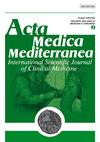The Association Between Comorbidities and a High-Risk Status According to COPD GOLD Groups
IF 0.3
4区 医学
Q4 Medicine
引用次数: 0
Abstract
Objective: The natural course of the chronic obstructive pulmonary disease (COPD) is thought to be affected by the severity of COPD, frequency of episodes, as well as the presence of comorbid conditions. It was aimed to explore the effect of comorbid conditions on high-risk status in stable COPD patients. Material and methods: Study participants consisted of stable COPD patients attending to the pulmonology outpatient unit of a tertiary center between 15th May 2018 and 12th Dec 2019. Demographic data, comorbidities, clinical index scores, modified Charlson comorbidity index score (mCCI), BODE index score, and the Short Form 36 (SF-36) scores as a generic life quality measure were recorded. Global Initiative for Chronic Obstructive Lung Disease (GOLD) groups were determined based on symptoms and exacerbations. Results: There were 23(25.8%), 31(34.8%), 2(2.2%), and 33(37.1%) patients in GOLD gropus A, B, C, and D, respectively. Among these, A and B groups are considered as low-risk, and C and D groups are considered as high-risk. High risk patients had higher mCCI (p < 0.001) and were more likely to have hypertension (p=0.012), congestive cardiac failure (p=0.029), chronic renal failure (p=0.022), osteoporosis (p=0.001), and anemia (p<0.001). In a logistic regression analysis performed to examine the determinants of high-risk status in COPD-GOLD groups, biomass exposure was found to increase the likelihood of having a high risk-status by 3-fold. Conclusion: Classification of stable COPD patients according to GOLD groups showed higher mCCI in subjects with high-risk status. Comorbidities and mCCI did not appear to affect the high-risk status. Biomass exposure was associated with an increased risk of having a high-risk status.COPD GOLD组中合并症与高危状态的关系
目的:慢性阻塞性肺疾病(COPD)的自然病程被认为受COPD的严重程度、发作频率以及合并症的存在的影响。目的是探讨合并症对稳定期COPD患者高危状态的影响。材料和方法:研究参与者包括2018年5月15日至2019年12月12日在某三级中心肺科门诊就诊的稳定型COPD患者。记录人口统计数据、合并症、临床指数评分、改良Charlson合并症指数评分(mCCI)、BODE指数评分和作为通用生活质量指标的短表36 (SF-36)评分。慢性阻塞性肺疾病全球倡议(GOLD)组是根据症状和恶化情况确定的。结果:GOLD A、B、C、D组患者分别为23例(25.8%)、31例(34.8%)、2例(2.2%)、33例(37.1%)。其中A、B组为低危组,C、D组为高危组。高危患者mCCI较高(p<0.001),更容易出现高血压(p=0.012)、充血性心力衰竭(p=0.029)、慢性肾衰竭(p=0.022)、骨质疏松(p=0.001)和贫血(p<0.001)。在一项检验COPD-GOLD组高风险状态决定因素的逻辑回归分析中,发现生物质暴露使高风险状态的可能性增加了3倍。结论:稳定期COPD患者按GOLD组分类,高危状态患者mCCI较高。合并症和mCCI似乎不影响高危状态。生物质暴露与处于高风险状态的风险增加有关。
本文章由计算机程序翻译,如有差异,请以英文原文为准。
求助全文
约1分钟内获得全文
求助全文
来源期刊

Acta Medica Mediterranea
医学-医学:内科
自引率
0.00%
发文量
0
审稿时长
6-12 weeks
期刊介绍:
Acta Medica Mediterranea is an indipendent, international, English-language, peer-reviewed journal, online and open-access, designed for internists and phisicians.
The journal publishes a variety of manuscript types, including review articles, original research, case reports and letters to the editor.
 求助内容:
求助内容: 应助结果提醒方式:
应助结果提醒方式:


